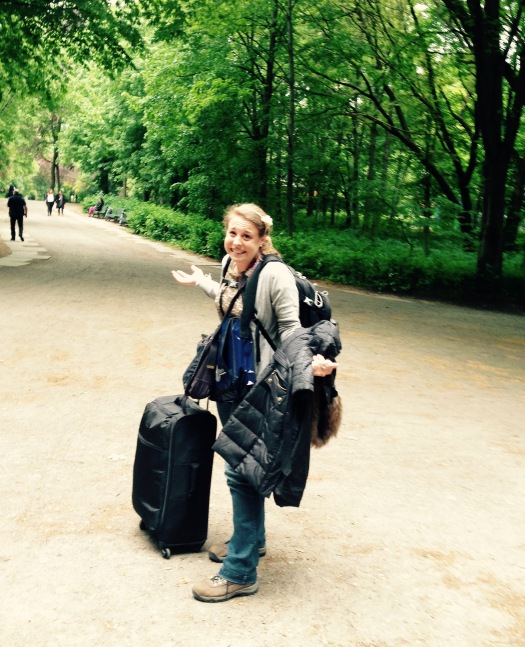
If you’ve been reading this blog for any extended period of time, then you know that I grew up in Kansas. I love to play up this fact, especially when traveling. Although international folks may not know of Kansas, they have usually heard of our two greatest (fictional) residents, Dorothy and Superman. I also apparently use a lot of Kansas-isms, phrases that supposedly people don’t say elsewhere: slower than molasses in January, circle the wagons, and cross that bridge when we come to it. All these phrases (and especially the first two) have prompted friends to tell me that my “Kansas is showing.”
Even though I proudly claim Kansas as home, many residents of my state would argue that I’m not truly from there. Because even though I shamelessly quote the Wizard of Oz and regularly advertise our tourist attractions (including the “world’s largest ball of twine” and, my personal favorite, the “They Also Ran” museum), many of my fellow Kansans would likely say that I haven’t really experienced my home state. And I guess I have to agree with them. My childhood was spent in the suburbs of Kansas City, where the lifestyle is more defined by soccer tournaments and shopping malls than wide open spaces. Certainly, I had encounters with the countryside and small-town life. During the summer, for instance, I would often spend a week with my cousins in southern Kansas, riding horses and exploring the pastures, but such experiences were the exception not the norm. Thus, although I proudly claim my Plains-state roots, I did not actually grow up anywhere near the “Little House on the Prairie.” 😦
That said, you don’t have to climb far up my family tree to find folks who really did live off the land. My grandparents (Omi and Opi) both grew up in farmhouses that didn’t get running water until at least the 1960s. Their parents raised cattle, milked dairy cows, and grew crops that they then sold on the back of their pickup truck in town. My ancestors knew all about cultivating the land and making a living from what it produced. Although we live in the suburbs, my nuclear family has maintained some aspects of this lifestyle. Several years ago we purchased a 100+ acre parcel of our ancestral land and, although we don’t farm it ourselves, we contract with some folks to grow crops on it. Depending on the year, there will be corn, soybeans, or nothing at all—if the land needs a rest.
Maybe it’s my Kansas roots that drew me to Psalm 37, which has become one of my favorite Scripture passages. Verse 3 says to “trust in the Lord and do good; dwell in the land and cultivate faithfulness.” As a suburbanite, I’ve never cultivated land in my life (in this year alone, I’ve killed three basil plants and two succulents); however, I’ve always found this imagery striking. What does it mean to cultivate faithfulness? And how can I better do this in my daily life?
Cultivating implies intentionality. It doesn’t just happen. Even if you plant seeds, crops won’t automatically grow. You have to water them consistently, and you have to routinely get your hands dirty and pluck the weeds. Cultivating requires attentiveness. In the same way, you can’t zone out or put your life on autopilot and expect faithfulness to happen. Growing into Christlikeness requires our effort. Salvation is a free gift of grace, but transformation only happens with our direct involvement. But what does this practically look like?
I’ve always been a journaler. I kept a diary on-and-off during my childhood and adolescence, and for the last ten years or so, I have journaled basically every night. In fact, now I can’t fall asleep without jotting down a few lines! Anyway, recently I’ve tried incorporating a specific type of journaling into my morning routine. (I didn’t come up with this idea on my own. The practice is really old, and my pastor often describes it in his sermons). The model is called the “Prayer of Examen,” and it involves taking daily stock of how your soul is doing. In five steps, you reflect on the previous day: thanksgiving, consolation, desolation, and invitation. Doing this “soul check-up” every day lets us tend to the metaphorical soil of our lives—the places where we need to be watered, the spots where the weeds are poking up out of the ground, and the areas where we can see God growing His fruit.
But how exactly does this spiritual exercise work? Let me walk you through it.
Thanksgiving: looking back over the previous day, make a list of things for which you are thankful. This first step is crucial, especially if you are going through a rough season or if, like me sometimes, you find yourself in a bad mood. Actively recognizing and saying “thanks” for good things allows us to lift our focus from what is wrong and to see our blessings instead. No matter how crummy life may be at the moment, there is always something for which we can be thankful. If you’re really desperate, “the air I breathe” is a completely acceptable item for the thankfulness list. 😊
Consolation: This old-timey word simply refers to ways that you could see yourself walking in step with God. Looking back on the previous day, where were you aligned with God and His purposes? Like the thankfulness list, the consolation section can contain virtually anything. For me, sometimes it’s having a day of focused and satisfying work. Other times, it’s an encouraging phone call with a friend or an impromptu conversation with the grocery store cashier. Chances are that the Holy Spirit has been working in some creative ways; we just need to take the time to look!
Desolation: As you likely gathered from the name, this section is essentially the opposite of the previous one. Where were you “misaligned” or out of step with God yesterday? Again, I find that this can take a lot of different forms, from having a negative attitude about doing the dishes to saying something mean or getting mad in traffic (a common Atlanta problem). My sin can be sneaky and creative, so I often take a couple extra minutes sitting with this question. Examining one’s heart isn’t for the faint of heart.
Repentance: After writing down the ways I erred, I then spend a moment naming these mistakes before the Lord and asking for His forgiveness. This step is SUPER important, especially because I tend to get down on myself and try to work harder rather than accepting God’s grace. By repenting and asking forgiveness, I am reminded again of the Gospel: that as a sinner, I am powerless to save myself, but through Jesus’ sacrificial death (i.e. not my own effort) I am made right with God.
Invitation: In this final step, we invite the Holy Spirit to walk alongside us and guide our steps during the coming day.
And there you have it; that’s the “Prayer of Examen,” aka my new favorite way to actively cultivate faithfulness in my life. Like all spiritual disciplines, this prayer practice is not a magic tool or a silver bullet, nor does it somehow manipulate God into loving us more. What it does do, however, is enable us to bring our hearts and lives before God on a daily basis and make us more in tune with and open to His Kingdom and its coming.
Thanks for reading and have fun “cultivating”! 😉



